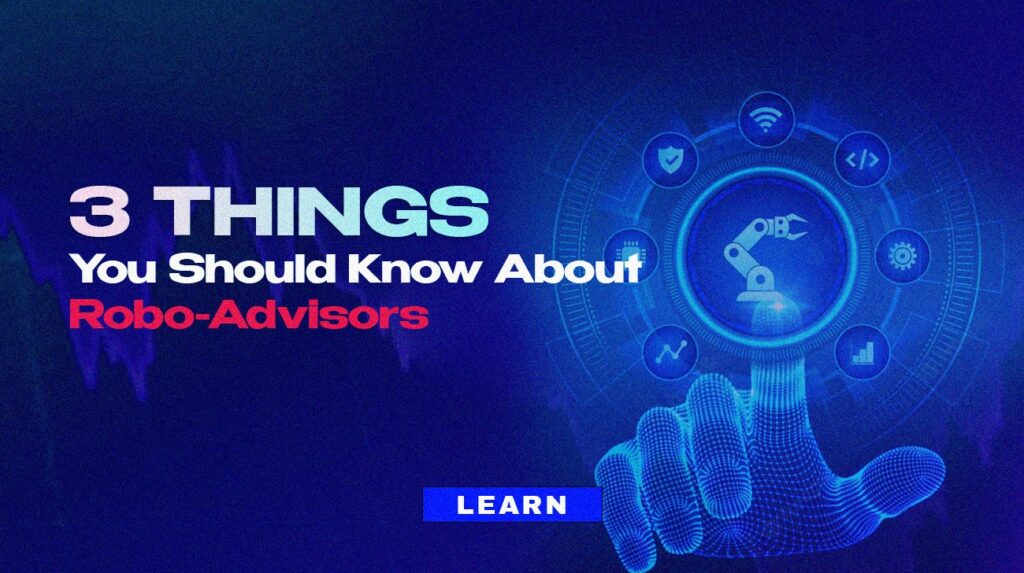
If you ever heard of a “Robo Advisor” 10 years ago, perhaps you will think of it as a new title for a sci-fi movie.
“Hey, have you heard of the newly released “Robo Advisor?”
“Wow, is that a new sci-fi movie?”
“Oh no, it’s an AI investment portfolio manager.”
The idea of an Artificial Intelligence (AI) managing your investment portfolio in just a few clicks on your smartphone, whenever and wherever you are while handling your other financial affairs, seems like a dream come true for many people! (especially if you are an introvert like many of us)
Finally, you don’t have to set an appointment with a Financial Advisor and explain everything about your financial situation which might be uncomfortable for some people who have sensitive financial issues.
Robo-Advisors have been becoming increasingly popular. However, it has been commonly misunderstood to be a sophisticated black-box trading algorithms.
The reality is it is not.
The simplest way to view Robo-Advisors is as an alternative to Financial Advisors. Robo-Advisors have disrupted the world of finance by providing a lower-cost alternative to a personalized service using state-of-the-art technology.
The concept is straightforward. If you had previously relied on a financial advisor to manage your investments, they would try to understand your financial goals, risk tolerance, and available investment horizon. With that information, you give your ‘mandate’ to this individual, and it now becomes his responsibility to invest your money into various products to meet your financial objectives. These products are often diversified across equity funds, bond funds, and fixed deposits.
From time to time, your financial advisor may call or write to you personally to update you on how your portfolio is tracking against your ‘mandate.’ He may also calm your nerves, especially when market sell-offs happen. Essentially, Financial Advisors provide personalized service to understand your needs and get paid by ensuring your investments achieve the long-term goals you’ve defined.
You can probably guess what the mere name change from Financial Advisor to Robo-Advisor means. It means that what previously was a personalized human service is now fully automated. How Robo-Advisors achieve that from a questionnaire that you fill up after you’ve opened an account aimed at determining your goals and risk tolerance.

Depending on your answers, the Robo-Advisors have algorithms to build a portfolio for you by allocating equity funds, bond funds, and fixed deposit type products. If your risk appetite is on the higher end of the spectrum, more allocation will be made towards equity funds and less towards bond and fixed deposit funds. Your portfolio composition will change with time, and instead of yourself, the changes will be fully managed by the Robo Advisor. With that being said, the only way you can steer your portfolio is if you change your answers to the questionnaire.
And Robo-advisors can do this cost-effectively by relying on automated technology and eliminating the need for expensive human labor. For this very reason, Robo Advisors have been gaining much traction because what previously was a costly service provided to the wealthy is now available to the masses.
However, there are three things you may wish to know about Robo-Advisors, that many people don’t realize.
#1 – Robo-Advisors Do Not Outperform Market Returns People that rely on Robo-Advisors are either satisfied so long as their portfolio generates positive returns (or at least matching market returns) and do not want the hassle of managing their investments themselves. However, many people do not realize that not all equity funds are created equal. The de facto portfolio, considered by most to best represent/benchmark market returns, is the S&P 500 index or any fund (mutual or exchange-traded) that closely tracks the S&P 500 index. However, research by Morningstar has shown that only 1.5% of funds manage to beat their benchmark. Hence, it is also the case that most Robo-advisors do not invest in these market-beating funds. Furthermore, by design, since Robo-advisors have to invest in a combination of equity funds, bond funds, and fixed deposit funds, your portfolio will never almost beat the market S&P 500 returns. Here’s an example of driving home this point:
| ||||||||||||||||||
#2 – Robo-Advisors do not make sense in markets trading sideways Historical S&P 500 Yearly Returns from 1928 to 2020 Based on historical S&P 500 data, 38 out of 94 years, the S&P 500 had a 5% or less annual return. That means that almost 40% of the time, the equities portion of your portfolio will not be making money for you and may even make losses. It does not make sense for investors that despite Robo-Advisors charging a lot less than human financial advisors, 40% of the time, you have to incur additional annual fee charges and withstand portfolio losses.
Source: https://blog.moneysmart.sg/invest/robo-advisors-singapore/ |
#3 – Robo-Advisors aren’t smart enough to minimize drawdowns during sudden Recessions Contrary to popular belief, probably due to the word ‘Robo’ associated with Robo-Advisors, many people think they have intelligent black-box algorithms that can identify recessions even before they occur and reallocate into safe-haven funds. Furthermore, they may also think Robo-Advisors have clever strategies to trim equity funds during market sell-off, deploy to bond funds or hold cash to buy into equities at the low.
Unfortunately, these are all myths. According to an article from Benzinga, most Robo Advisors do NOTHING in periods of a downturn or when the market moves.
Can you imagine if you need money unexpectedly during a recession, probably because you lost your job and had to rely on your Robo-Advisor funds? If you had to liquidate them during a recession, you would probably have to forgo significant profits or, in the worst case, may also have to accept losses! |
CONCLUSION
- Are you interested in investment solutions that are better than Robo-Advisors? They do exist and are commonly referred to as “Robo-Investing.” Our unique Robo-Investing solutions disrupt the Hedge Fund industry by making these strategies available to the mass market instead of being exclusive to the wealthy.
- AlgoMerchant’s Robo-Investing solutions are based on Artificial Intelligence (AI) strategies and are truly intelligent. In addition, our solutions are emotionless, thus genuinely unbiased, and more importantly, have a proven track record of beating market returns!
Key Takeaway: Not many people realize these three limitations regarding Robo-Advisors
|
Here’s a summary comparison of AlgoMerchant’s Robo-Investing solutions versus Robo-Advisors:
|
Capabilities |
AlgoMerchant Robo-Investing |
Robo-Advisors |
|
Designed to beat Market Returns? |
Yes |
No |
|
Designed to be profitable during the sideway market? |
Yes |
No |
|
Designed to limit drawdowns and be profitable during market sell-offs? |
Yes, our AI solutions were profitable during the COVID-19 pandemic sell-off. |
No |
|
100% unbiased and without human emotions? |
Yes, our AI technology enables this. |
No, individual risk tolerance and expected returns can influence portfolio allocations |
|
100% automated (no trading action on clients) |
Yes |
Yes |
|
Able to allocate capital intelligently based on market conditions? |
Yes, designed to exploit market inefficiencies |
No, designed to allocate capital based on the individual’s risk tolerance and not market conditions. |
|
Safeguarding investor’s money |
100%, robots are subscription based and linked to client’s account managed by client himself/herself |
Capital managed by Robo-Advisor company, default risks exist. |
Please note that all the information contained in this newsletter is intended for illustration and educational purposes only. It does not constitute any financial advice/recommendation to buy/sell any investment products or services.




